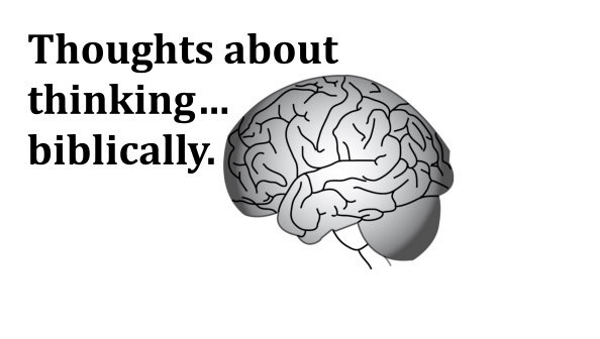By Tyson Thorne

What do we mean by “think biblically”? Or perhaps a better place to begin is, what is it we are reading when we attempt to read the Bible? No doubt most will answer, as we’ve been trained, with “words”. A Christian may even answer, “God’s words”. Neither answer is correct. Word’s on a page communicate nothing unless they adhere to rules of language, and even then the purpose may be obscured. No, what we read when we come to any literature are thoughts. In the case of the Bible, we are reading God’s thoughts. To “think biblically” then is to “think God’s thoughts”.
Why is this important? Because while actions are important, as James argues in his epistle, actions are a result of belief, which is itself developed by our thoughts. Our ability to think, to reason, is one of the things that sets us apart from the animals and is one of the things that allows us to know God. Read John 21.25:
There are many other things that Jesus did. If every one of them were written down, I suppose the whole world would not have room for the books that would be written.
Jesus did a great many things that are not recorded in the Gospels. Why? Because as interesting and miraculous as those things were, they are unimportant. The Gospel writers mostly recorded Jesus’ teachings and used the Lord’s actions, and those around him, for context. We read what Jesus taught, and we see that his actions are consistent with his teachings. Just like Jesus performed miracles to prove that his message was anointed by God, so too Matthew, Mark, Luke and John use Jesus’ activity to emphasize Jesus’ teachings.
All thoughts may be interesting on some level, but not all thoughts are believed. Everyone at one time or another has thought how great it would be to fly like Superman, but no one jumps off a bridge believing they can. People act, and refrain from acting, based on belief. This is what James argues in chapter two of his letter:
You see that his faith was working together with his works and his faith was perfected by works. (Verse 22)
James uses the terms faith and works instead of belief and actions, but the point is the same. If we claim to believe (or have faith) but never act on that belief (works) then either we do not believe that which we claim to or we consider it unimportant.
So our actions flow from our beliefs, meaning one will not happen without the other, but if you had to choose between them which should be preferred? This is a question the Gospel’s authors had to wrestle with. They chose to focus on Jesus’ teachings, his thoughts and beliefs, over and above most of his acts. They did this because we are not able to do everything Jesus did. Most of the time miracles are outside of our wheelhouse. But we can believe rightly, and in so doing we will live (act) rightly.
I’ll leave you with one final thought. When we remember friends and family who have passed on, we at first miss the things we did with them (actions) but over time we come to appreciate more the things they said and that we learned from or laughed at (thought and belief). Acts change over time, but truth is forever. For this reason we should all strive to think biblically.
|
|
